Although the majority of my readers were not born when the attack on Pearl Harbor occurred, and many of my readers parents were probably too young to have served in WWII, this is the day the worst attack on American soil occurred prior to 9/11. A total of 2,403 Americans died and 1,178 were wounded. Even though this is an American event, it affected the majority of the world. I am sharing this again because I couldn't find anything better than this post I created a couple of years ago. Since many are new to my blog, I thought it was appropriate to share it again.
This is a LONG diatribe and I offer very few references, because most of this information is my own that I learned as an undergrad, from books I've read, or documentaries I've seen on WWII. All opinions are my own. All photos are from Wikipedia, unless otherwise specified.
The events leading up to the attack on Pearl Harbor can be traced back to 1852, while Japan was still an isolationist country. Until that time, trade with the west was strictly limited to the Dutch trading in Nagasaki. Since Westerners weren't allowed in the country, their influence was strongly discouraged.
.png/800px-Gasshukoku_suishi_teitoku_k%C5%8Dj%C5%8Dgaki_(Oral_statement_by_the_American_Navy_admiral).png) In July, 1853, Commander Matthew C. Perry, sent by the U.S. to forcibly
establish trade with Japan, initially faced resistance. It didn't take
Perry long to overpower the Japanese, though,
In July, 1853, Commander Matthew C. Perry, sent by the U.S. to forcibly
establish trade with Japan, initially faced resistance. It didn't take
Perry long to overpower the Japanese, though,  and within less than a year, he established American trade with Japan.
While Japan's isolation had allowed the Japanese to think they were a
powerful nation, Perry showed they were no match for outsiders who
wanted to modernize their country.
and within less than a year, he established American trade with Japan.
While Japan's isolation had allowed the Japanese to think they were a
powerful nation, Perry showed they were no match for outsiders who
wanted to modernize their country.It didn't take the Japanese long to begin their reformation. They started by ousting the shogun, who was the ruler at the time, and placed the emperor back in control. They watched how the west had colonized many countries, and began their own colonization process. This led to their need for new materials and goods, which were in short supply in Japan. Not only did they begin imitating the West, they began dressing like them, too.
By trying to imitate a 19th century European power, they had to engage in imperialism. The obvious target for imperialism was Korea. The problem was that the Korean king paid tribute (monetary contributions similar to taxes) to the Chinese emperor. While the Japanese could, and did force the Koreans to sign some unequal treaties, the peninsula remained free of the Japanese. However, in 1894, China sent troops into Korea to help put down a rebellion, violating a previous treaty, so the Japanese also sent in troops. Fighting broke out which lead to the First Sino-Japanese War in 1894 and 1895.
The Chinese lost the war, and lost it badly. After that, Korea stopped paying tribute to China and soon became a Japanese tributary state. Japan also took over Taiwan, which led to the rivalry with Russia over Manchuria.
 From there, the rivalry escalated to the Russo-Japanese War which lasted
18 months in 1904 and 1905. Japan emerged the winner and was now
looked on as a world leader. Manchuria was taken over, as was Korea,
since the Russians were in no position to maintain control.
From there, the rivalry escalated to the Russo-Japanese War which lasted
18 months in 1904 and 1905. Japan emerged the winner and was now
looked on as a world leader. Manchuria was taken over, as was Korea,
since the Russians were in no position to maintain control.
 During WWI, Japan joined the Allies, where they took out Germany's colonial empire in the Pacific Ocean.
During WWI, Japan joined the Allies, where they took out Germany's colonial empire in the Pacific Ocean.  China was backed by the United States and the allies in their war efforts.
China was backed by the United States and the allies in their war efforts. This included New Guinea, Micronesia, the Marshall Islands, and Samoa.
This was probably when Japan was the most powerful and largely accepted
by
Western powers. It was obvious Japan had acted exactly as the various
European colonial powers had.
This included New Guinea, Micronesia, the Marshall Islands, and Samoa.
This was probably when Japan was the most powerful and largely accepted
by
Western powers. It was obvious Japan had acted exactly as the various
European colonial powers had.However, during the period of peace between the two world wars, aggressively expansionist moves, though far from unheard of, were frowned on by many nations. It wasn't simply a matter of geopolitics, either. Most people in Europe really did not want another war, and the countries that seemed to be provoking those wars were looked upon unfavorably. Because Japan hadn't suffered in WWI the way countries like France and Belgium had, they were looked upon as warmongers, or part of a group who wanted to bring the world once again to the brink of war.
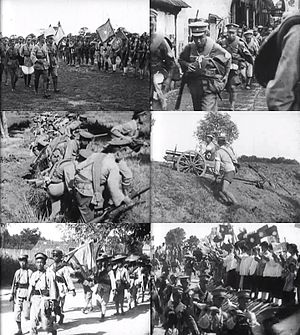 Also during this time, China began to get organized. First the south
was unified under its government, then the military campaign, led by
Also during this time, China began to get organized. First the south
was unified under its government, then the military campaign, led by Chiang Kai-shek from 1926 to 1928 by what is now called the Northern
Expedition, aided by Soviet arms, unified China by ending the rule of
the the local warlords along the Yangtze River.
Chiang Kai-shek from 1926 to 1928 by what is now called the Northern
Expedition, aided by Soviet arms, unified China by ending the rule of
the the local warlords along the Yangtze River.After defeating the warlords, the Nationalist army turned on Britain, who became their primary enemy. In response, the British retaliated in Hankou and Jiujiang but prepared to defend Shanghai. It was at that point the alliance between the communists and the Nationalists fell apart. When communist led labor unions captured Shanghai for Chiang Kai-shek, he attacked and suppressed them, and when he set up his new government in Nanjing he expelled the communists from it. These actions led to the reunification of China in 1928, but made an enemy of the Soviets. This also brought the north under the control of the Nationalist government, which was set up in the city of Nanjing. Nationalist China still had issues, a few warlords among them, but by 1928 it was in much stronger shape militarily.
Japan viewed China's reunification as a threat to its control of Manchuria's railroads. Losing anything to China was seen as unacceptable, so in 1931, the Japanese invaded Manchuria to protect their interests in the railroad. Japan subsequently set up a puppet state which nobody else recognized as a legitimate state. This isolated Japan, and it also meant a continuing series of border clashes with the Chinese.
 Eventually, in
1937, the Japanese provoked the Chinese into a full-scale war, known as the Second Sino-Japanese War, or the Eight Year War.
Eventually, in
1937, the Japanese provoked the Chinese into a full-scale war, known as the Second Sino-Japanese War, or the Eight Year War. This was a bloody war, with many photos too gruesome to show on my blog. However, this is a photo of Japanese soldiers with gas masks and rubber gloves on during the Battle of Shanghai. More details:
This was a bloody war, with many photos too gruesome to show on my blog. However, this is a photo of Japanese soldiers with gas masks and rubber gloves on during the Battle of Shanghai. More details:The Second Sino-Japanese War (July 7, 1937 – September 9, 1945) was a military conflict fought between the Republic of China and the Empire of Japan. From 1937 to 1941, China fought Japan with some economic help from Nazi Germany (until 1938), the Soviet Union (1937-1940) and the United States (see American Volunteer Group). After the Japanese attack on Pearl Harbor, the war merged into the greater conflict of World War II as a major front in the Pacific Theatre. The Second Sino-Japanese War was the largest Asian war in the twentieth century. It also made up more than 50% of the casualties in the Pacific War.
Although the two countries had fought intermittently since 1931, full-scale war started in earnest in 1937 and ended only with the surrender of Japan in 1945. The war was the result of a decades-long Japanese imperialist policy aiming to dominate China politically and militarily, and to secure its vast raw material reserves and other economic resources, particularly food and labor. At the same time, the rising tide of Chinese nationalism and notions of self-determination stoked the coals of war. Before 1937, China and Japan fought in small, localized engagements, so-called "incidents". Yet the two sides, for a variety of reasons, refrained from fighting a total war. In 1931, the Japanese invasion of Manchuria by Imperial Japan's Kwantung Army followed the "Mukden Incident". The last of these incidents was the Marco Polo Bridge Incident of 1937, marking the beginning of full scale war between the two countries.Had the Second Sino-Japanese War been a short one, the Japanese might have walked away with a hugely favorable treaty and land cessions similar to the First Sino-Japanese War.
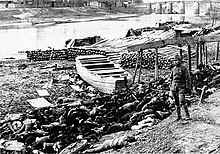 However, the
Nationalist government didn't give in, so this took many more resources
than Japan had at the time. In my opinion, this was the beginning of
Japan's decision to bomb Pearl Harbor, since this war pushed the
Japanese economy and the military to the breaking point.
However, the
Nationalist government didn't give in, so this took many more resources
than Japan had at the time. In my opinion, this was the beginning of
Japan's decision to bomb Pearl Harbor, since this war pushed the
Japanese economy and the military to the breaking point.Japan's supplies of rubber, iron, and oil were pushed to the breaking point, who now had no allies in the region. The view in the international community was that Japan was a rogue state, which did not help Japan procure the materials needed to keep fighting the war in China. An attack on a U.S. gunboat on the Yangtze River alienated the U.S., as did widespread Japanese atrocities against Chinese civilians. Eventually, this led to embargoes on trade with Japan.
At this point, Japan was in peril. It had assembled a colonial empire both to enable Western-style industrialization and to establish credibility as a great power. Yet, because World War I hadn't affected Japan in the same way it had Europe, Japan's continued warmongering actions now alienated both the U.S. and Europe. I remember the gist of a quote from a book I read on WWII was that the West taught Japan poker, but after Japan won all the chips, declared the game immoral. And while it's true that the Western powers hadn't perpetrated anything along the lines of the Rape of Nanking, the bloody battle that involved persecution, looting, and rape when Japan took the capitol city of China, the West was not blameless in some of their actions, either.
Since Japan desperately needed resources, there were only two places to get them. One place was Siberia and the other was the South Pacific. The Imperial Army favored invading Siberia, while the Imperial Navy wanted to take the South Pacific.
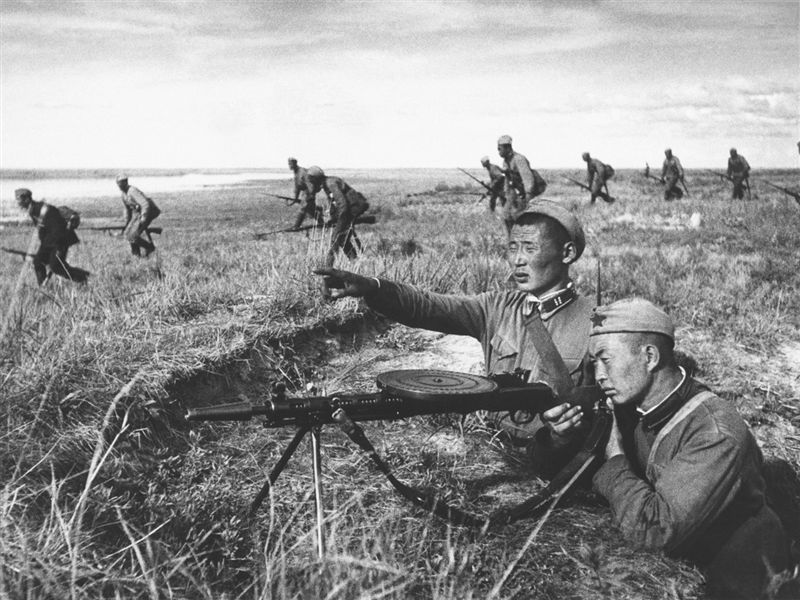 The Imperial Army was forced to abandon their quest for Siberia when in
August, 1939, just weeks before Hitler and Stalin invaded
Poland, the Soviet Union and Japan fought a massive tank battle on the
Mongolian border. The Soviets won a crushing victory, the largest the
world had ever seen to date. Defeat persuaded the Japanese to expand
into the Pacific, where they saw
the United States as a weaker opponent than the Soviet Union. And
although this is just conjecture, if the
Japanese had not lost this battle, they might never have attacked
Pearl Harbor.
The Imperial Army was forced to abandon their quest for Siberia when in
August, 1939, just weeks before Hitler and Stalin invaded
Poland, the Soviet Union and Japan fought a massive tank battle on the
Mongolian border. The Soviets won a crushing victory, the largest the
world had ever seen to date. Defeat persuaded the Japanese to expand
into the Pacific, where they saw
the United States as a weaker opponent than the Soviet Union. And
although this is just conjecture, if the
Japanese had not lost this battle, they might never have attacked
Pearl Harbor.
It was a decisive victory for the Soviets in other ways, too. When the Japanese decided to expand in the south, it also meant that the Soviets didn't have to fight on two fronts, but could use their troops against the threat of Nazi Germany in the West. In terms of its strategic impact, this battle and subsequent Soviet victory was one of the most decisive battles of the Second World War. It also served to show the Japanese military that it was not a match for the Soviets, especially since Japanese forces were still fighing throughout China. The Soviets forces were stunning, while Japanese tactics remained stuck in the traditional mindset that more highly valued honor and personal bravery on the battlefield than massive forces.
 The end result to all this was the Imperial Japanese Navy got its way,
although it had to deal with the fact that
the South Pacific had already been colonized. As a result, there were
simultaneous
attacks on Pearl Harbor, Singapore, Hong Kong, the Philippines, and
Malaya. The Japanese felt the United States was a less formidable
adversary and didn't want war with the U.S. or the British while they
scrambled for rubber and oil. This turned out to be suicidal
and a complete misreading of how the Americans would react to Pearl
Harbor, but it was, as I see it, about 90 years in the making. The
above photo shows what Pearl Harbor looked like in October, 1941.
The end result to all this was the Imperial Japanese Navy got its way,
although it had to deal with the fact that
the South Pacific had already been colonized. As a result, there were
simultaneous
attacks on Pearl Harbor, Singapore, Hong Kong, the Philippines, and
Malaya. The Japanese felt the United States was a less formidable
adversary and didn't want war with the U.S. or the British while they
scrambled for rubber and oil. This turned out to be suicidal
and a complete misreading of how the Americans would react to Pearl
Harbor, but it was, as I see it, about 90 years in the making. The
above photo shows what Pearl Harbor looked like in October, 1941._burning_after_the_Japanese_attack_on_Pearl_Harbor_-_NARA_195617_-_Edit.jpg/800px-The_USS_Arizona_(BB-39)_burning_after_the_Japanese_attack_on_Pearl_Harbor_-_NARA_195617_-_Edit.jpg) Even though Pearl Harbor was a defeat for U.S. troops and the Pacific
Fleet, the Japanese didn't learn the lessons handed them by the
Soviets. Honor and bravery remained central to the Japanese military
mentality
and, once they had recovered from the initial onslaught, the U.
S. and Britain were able to combine forces and push the Japanese
out of the Pacific and back to Japan in one brutal battle
after another.
Even though Pearl Harbor was a defeat for U.S. troops and the Pacific
Fleet, the Japanese didn't learn the lessons handed them by the
Soviets. Honor and bravery remained central to the Japanese military
mentality
and, once they had recovered from the initial onslaught, the U.
S. and Britain were able to combine forces and push the Japanese
out of the Pacific and back to Japan in one brutal battle
after another.This leads to another point I personally saw that still existed, albeit far less, when I worked with Japanese in industry. The Japanese believed that America, as a nation of diverse races of peoples, was a mongoloid mix incapable of acting with a united resolve. That perception was fueled by the propaganda perpetrated by Japan that they were the superior race.
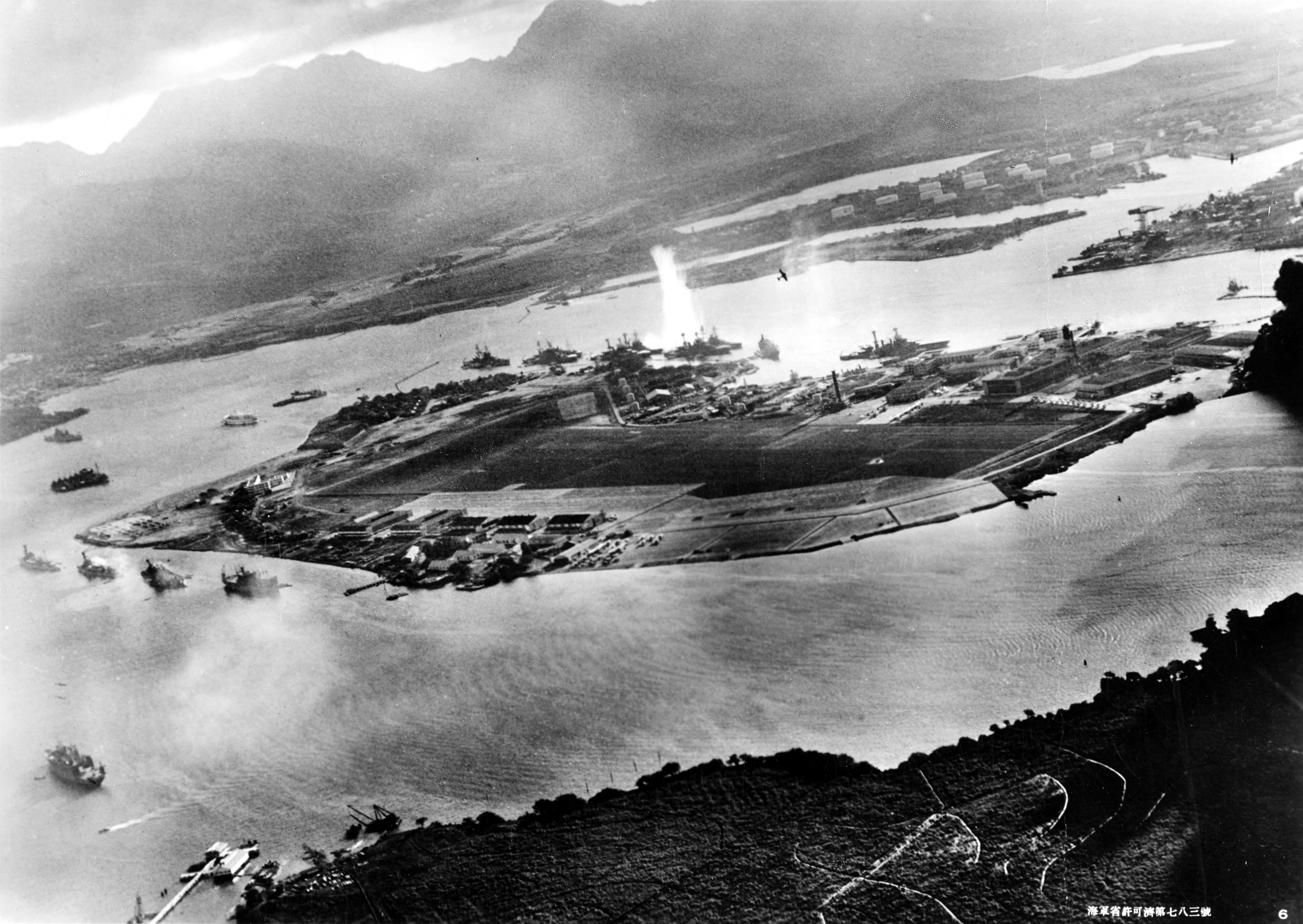 America was quite alien to the Japanese, and
it's not surprising that the homogeneous Japanese couldn't
comprehend how such a diverse range of extreme individuals, an attribute
prized by Americans, could possibly become a united and unified body.
America was quite alien to the Japanese, and
it's not surprising that the homogeneous Japanese couldn't
comprehend how such a diverse range of extreme individuals, an attribute
prized by Americans, could possibly become a united and unified body.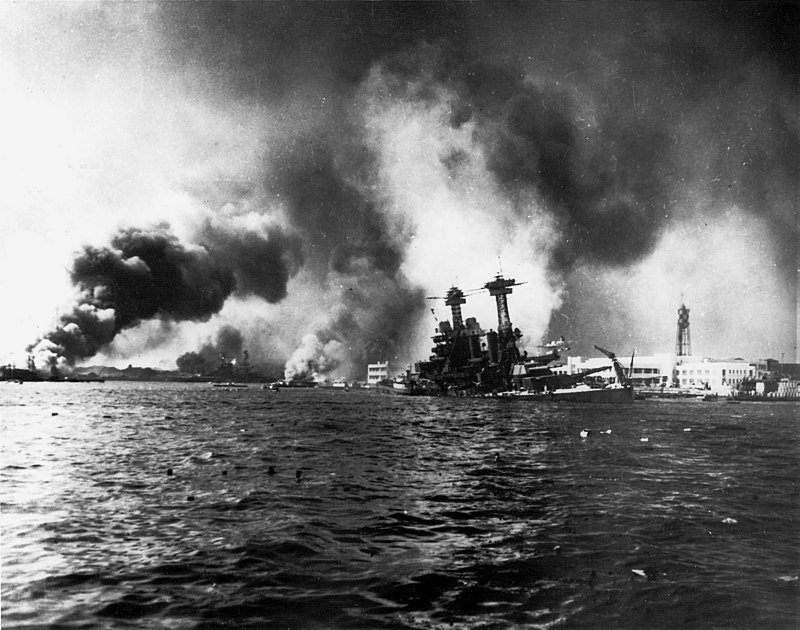 Beside the fact the Japanese wanted the oil, rubber, food, and wealth
they thought they could gain by conquering the U.S. through economic
attrition, they also
hoped they could wear the U.S. down politically, which would enable them
to keep
their conquests.
Beside the fact the Japanese wanted the oil, rubber, food, and wealth
they thought they could gain by conquering the U.S. through economic
attrition, they also
hoped they could wear the U.S. down politically, which would enable them
to keep
their conquests.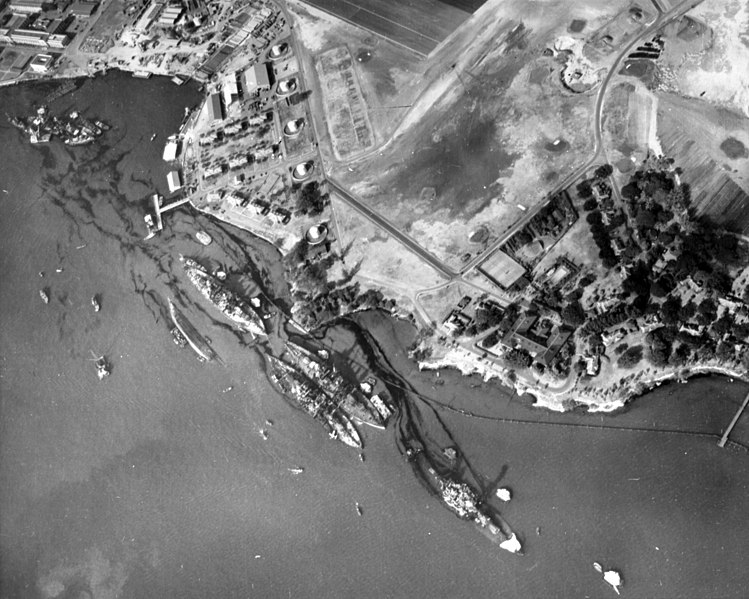 Not everything went according to plan, though. According to Wikipedia:
Not everything went according to plan, though. According to Wikipedia:Important base installations such as the power station, shipyard, maintenance, and fuel and torpedo storage facilities, as well as the submarine piers and headquarters building (also home of the intelligence section) were not attacked.Although the Japanese dealt a huge blow that December 7, 1941, it didn't take the U.S. long to regain control. This was especially true since, also according to Wikipedia:
Within six months, five battleships and two cruisers were patched or refloated so they could be sent to shipyards in Pearl Harbor and on the mainland for extensive repair.Further, to our (U.S.) shame, according to the same Wikipedia article:
One further consequence of the attack on Pearl Harbor and its aftermath was that Japanese American residents and citizens were relocated to nearby Japanese-American internment camps. Within hours of the attack, hundreds of Japanese American leaders were rounded up and brought to high-security camps such as Sand Island.And finally, also according to Wikipedia:
Fortunately for the United States, the American aircraft carriers were untouched by the Japanese attack; otherwise the Pacific Fleet's ability to conduct offensive operations would have been crippled for a year or more (given no diversions from the Atlantic Fleet). As it was, the elimination of the battleships left the U.S. Navy with no choice but to rely on its aircraft carriers and submarines—the very weapons with which the U.S. Navy halted and eventually reversed the Japanese advance. While six of the eight battleships were repaired and returned to service, their relatively low speed and high fuel consumption limited their deployment, and they served mainly in shore bombardment roles.
.jpg/1024px-USS_Enterprise_(April_1939).jpg) Aircraft carriers dominated the seas in WWII. They played a crucial
role in every major naval battle because they were built for speed and
efficiency. They carried fighter planes, dive bombers, and torpedo
planes.
Aircraft carriers dominated the seas in WWII. They played a crucial
role in every major naval battle because they were built for speed and
efficiency. They carried fighter planes, dive bombers, and torpedo
planes.
 This is what Ford Island that sits inside Pearl Harbor looked like in 1985.
This is what Ford Island that sits inside Pearl Harbor looked like in 1985.
 This image, found on satimagingcorp.com can be enlarged. Note the U.S.S. Arizona Memorial and the U.S.S. Utah
Memorial. If you compare this photo to the one below, you can make out the U.S.S. Missouri Museum.
This image, found on satimagingcorp.com can be enlarged. Note the U.S.S. Arizona Memorial and the U.S.S. Utah
Memorial. If you compare this photo to the one below, you can make out the U.S.S. Missouri Museum. The U.S.S. Missouri Museum can be seen to the left and below
the USS Arizona on the satellite image. I couldn't find the author of
this photo.
The U.S.S. Missouri Museum can be seen to the left and below
the USS Arizona on the satellite image. I couldn't find the author of
this photo.
 This photo is
from Anders.com.
This photo is
from Anders.com.I hope this story, as told by me in honor of Pearl Harbor, was meaningful. I also hope you learned a bit about why the Japanese bombed Pearl Harbor. There are many more reasons that I could have given, but I feel I've written enough for now. I find it odd that I learned so much about WWII in school and books, yet knew nothing about Vietnam.
Thanks for visiting, thanks for remembering Pearl Harbor, and thanks for reading through this long post.

















































































.JPG)

























14 thoughtful remarks:
A really meaningful post - thank you Elizabeth! So sad - and specially that there are already wars everywhere as you showed us yesterday! I have seen a good documentary recently about Pearl Harbor as well and the last year I saw the film for the first time. But I can't memorize all the facts - I always just think of all the harm and grief and that those led to Hiroshima what was the most horrible thing ever in my eyes.
And I often think that it is unbelievable that all this was caused by this mad monster Hitler - uncredible.
Wishing a happy Thursday dear Elizabeth!
This is so sad, and while I learned some of this in school so many years ago, it's quite eye opening to see it all put in order this way to see all that happened. To be honest, I don't know that I really understood it all, until reading this info, as always,I'm so appreciative that you've taken the time to put it all together and to share. This is truly a great and informative post. Hugs...RO
I'm glad you reposted this Elizabeth as I found this really interesting for many reasons. First of all my Dad served in WWII. He was in army intelligence and was tracking the Japanese in China as they were being pushed back out of the country. I found that history interesting because I didn't know about how the Japanese came to be in China in the first place. Then you mentioned the first Russo-Japanese War in 1905 and that war treaty was signed here in New Hampshire, in Portsmouth, where I work. It is because of that treaty signing that we have our particular sister city (where the Japanese representative signer was from), and why our school travels to Japan each spring. I like how you mentioned the idea of the Japanese felt superior. I know many of them love the US now but do they still feel superior to us? it is such a different culture. Thanks for the reminder that it is Pearl Harbor Day too. Hugs-Erika
A very interesting article. Hugs, Valerie
I was so interested to read your post, and I learnt a lot through it. I’ve seen films and documentaries about Pearl Harbor but was unaware of the background. Thank you so much for sharing this.
I had no idea how far back the pot began to boil. So it was interesting to read the lead up to the strike on Pearl Harbor. Interesting, too, US Intelligence had reports of the impending attack, but never gave the information to the President. As to Japanese-American citizens being sent to camps, it didn't just happen to those US citizens, but to Italian-American and German-American citizens as well. So much of the real history we were never taught.
Thank you for this. It's always helpful to explore the why as well as the what when considering historic events like this one.
Thank you, Elizabeth. A LOT of work and history went into this post. I'm going to have to spend sometime rereading and absorbing.
Excellent post.
Thanx for taking the time to post this Elizabeth; having had various family members serve in all branches of the military; this post serves as a reminder of the sacrifices the military goes through; and it is important we all get a better understanding of such
♥♥♥
This is a wonderful post to re-visit, especially when the event is remembered today. I'd never seen a photo of the Pearl Harbour Memorial , thank you for sharing this moving post.
Yvonne xx
Oh Elizabeth you certainly know how to lead a tribute! I always learn so much from your "history' posts - once again so many facts to take in. I shall be reading this again!! Hugs, Chrisx
Such a wonderful way to remember! Hubby and I were talking with his grandmother today and she was born two days after December 7, 1941. She said she remembers all the bells ringing 4 years later when the war ended. I would love to visit the museum in Hawaii some day.
Thank you for the reminder!
Kate
Hi! I am not a new follower. I took a blog break and came back recently. This is very pretty that you shared of Pearl Harbor. Thank you for the remembrance I am only forty-six. My Uncle was on the USS Arizona when it was bombed. He was standing on deck by the rails, enjoying a cigarette and talking to his friend. Then they were in the water. His friend was lying next to him dead instantly from the explosion. My Uncle, luckily survived but never was the same mentally or emotionally. He was the best Uncle in the world with a sweet kindness that only angels have. My other Uncle was a Purple Heart recipient for D-day. My Father had a heart condition but he still served. He repaired typewriters for the coders. He also repaired guns for the officers and was part of Artie Shaw's band. WWII was a big deal in my home, even though I was not born in that time it is part of my history I keep alive. Thank you again for your remembrance. I hope it touched others as much as me.
thank you for this one, Elizabeth.
It was informative and heartfelt..I'll be sure to read it again with my little girl, as it's very educational.
Post a Comment